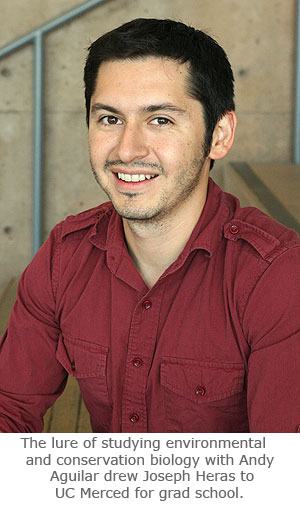

What do you do with a doctorate in
Quantitative and Systems Biology?
If everything goes his way, graduate student Joseph Heras will fulfill his post-doctoral research at the Natural History Museum in Los Angeles or New York City or the Smithsonian in Washington D.C. Then join the faculty at an institution with a strong emphasis on teaching.
A native of Southern California, Heras is a first-generation student who was lured to UC Merced by his desire to study evolutionary and conservation biology under
School of Natural Sciencesassistant professor
Andres Aguilar.
Heras became acquainted with Aguilar’s research while working on his master’s degree in biology at California State University, Los Angeles. He quickly realized their research interests were similar and followed Aguilar to UC Merced in January 2008. Although he didn’t not know what to expect, he is enjoying the small-town atmosphere and friendly neighbors.
“I enjoy being part of a small community of graduate students who are motivated to do research and collaborate on research projects that are interdisciplinary,” Heras said. “Our group has a great sense of humor and a strong passion for the field of ecology and evolution.”
Heras, who earned his bachelor’s degree from UC Riverside, is studying the molecular evolutionary process in rockfish, a diverse group of marine fish with about 102 known species. His research focuses on how genes under selection have prompted this rapid speciation. His days are spent scanning through genomic data from several species of rockfish to identify candidate genes under selection.
Heras and his colleagues are generating sequence data from expressed sequence tag libraries from rockfish species. They are collaborating with professors
Monica Medinaand
David Ardelland their students to develop genomic resources and pipelines for computational analyses of rockfish.
“I enjoy being in an environment where my lab mates are dedicated to helping each other with laboratory techniques and scientific concepts,” he said. “Being part of the Ph.D. program has allowed me to approach problems from different angles and also to be patient.”
Heras is actively involved in promoting UC Merced’s graduate programs. Recently, he gave a presentation to CSULA students as part of Center for Environmental Analysis - Centers of Research Excellence in Science and Technology program. He has a strong interest in increasing underrepresented minorities participation in college preparatory courses and encouraging students to pursue degrees in the fields of science, engineering and mathematics.
Heras was one of three
graduate studentsto win a Faculty Mentors Fellowship in 2008-09. The year-long fellowship helped him develop advanced research skills under faculty mentorship. In addition to receiving a graduate student travel award, the fellowship made it possible for him to attend and present his research at “Evolution 2009,” an annual meeting hosted by the Society for the Study of Evolution, the Society of Systematic Biologists and the American Society of Naturalists, held in Idaho over the summer.






